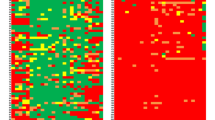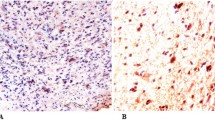Abstract
Objective
The prognostic significance of O 6-methylguanine DNA methyltransferase (MGMT) was evaluated by analysis of both MGMT promoter methylation and protein expression in a series of patients with newly diagnosed glioblastoma.
Methods
Seventy-three patients with glioblastomas treated with alkylating agents were analyzed for MGMT expression by immunohistochemistry. Genomic DNA was isolated from frozen surgical specimens obtained from 62 of 73 patients. MGMT promoter methylation was determined by methylation-specific polymerase chain reaction. The prognostic significance of MGMT was evaluated together with other well-known prognostic factors.
Results
MGMT promoter hypermethylation was detected in 35 of 62 patients (56.4%). MGMT immunoreactivity was low in 26 (35.6%) tumors, moderate in 24 (32.9%), and high in 23 (31.5%). Significant correlation was observed between MGMT expression and MGMT promoter methylation (P < 0.001). Both MGMT promoter methylation and low MGMT expression were independently associated with better progression-free survival but not with longer overall survival. However, in the subgroup analysis, MGMT promoter hypermethylation was significantly associated with longer overall survival in patients treated with temozolomide (TMZ) after nimustine hydrochloride (ACNU) treatment.
Conclusions
Low MGMT expression and MGMT promoter methylation are both predictive markers for slower tumor progression in patients with glioblastoma.



Similar content being viewed by others
References
Roth JG, Elvidge AR (1960) Glioblastoma multiforme: a clinical survey. J Neurosurg 17:736–750
Salford LG, Brun A, Nirfalk S (1988) Ten-year survival among patients with supratentorial astrocytomas grade III and IV. J Neurosurg 69:506–509
Chandler KL, Prados MD, Malec M et al (1993) Long-term survival in patients with glioblastoma multiforme. Neurosurgery 32:716–720
Devaux BC, O’Fallon JR, Kelly PJ (1993) Resection, biopsy, and survival in malignant glial neoplasms. A retrospective study of clinical parameters, therapy, and outcome. J Neurosurg 78:767–775
Salvati M, Cervoni L, Artico M et al (1998) Long-term survival in patients with supratentorial glioblastoma. J Neurooncol 36:61–64
Scott JN, Rewcastle NB, Brasher PM et al (1999) Which glioblastoma multiforme patient will become a long-term survivor? A population-based study. Ann Neurol 46:183–188
Shinojima N, Kochi M, Hamada J et al (2004) The influence of sex and the presence of giant cells on postoperative long-term survival in adult patients with supratentorial glioblastoma multiforme. J Neurosurg 101:219–226
Krex D, Klink B, Hartmann C et al (2007) Long-term survival with glioblastoma multiforme. Brain 130:2596–2606
Kamiryo T, Tada K, Shiraishi S et al (2004) Correlation between promoter hypermethylation of the O6-methylguanine-deoxyribonucleic acid methyltransferase gene and prognosis in patients with high-grade astrocytic tumors treated with surgery, radiotherapy, and 1-(4-amino-2-methyl-5-pyrimidinyl)methyl-3-(2-chloroethyl)-3-nitrosourea-based chemotherapy. Neurosurgery 54:349–357
Stupp R, Mason WP, van den Bent MJ et al (2005) Radiotherapy plus concomitant and adjuvant temozolomide for glioblastoma. N Engl J Med 352:987–996
Hegi ME, Diserens AC, Gorlia T et al (2005) MGMT gene silencing and benefit from temozolomide in glioblastoma. N Engl J Med 352:997–1003
Esteller M, Hamilton SR, Burger PC et al (1999) Inactivation of the DNA repair gene O6-methylguanine-DNA methyltransferase by promoter hypermethylation is a common event in primary human neoplasia. Cancer Res 59:793–797
Watts GS, Pieper RO, Costello JF et al (1997) Methylation of discrete regions of the O6-methylguanine DNA methyltransferase (MGMT) CpG island is associated with heterochromatinization of the MGMT transcription start site and silencing of the gene. Mol Cell Biol 17:5612–5619
Esteller M, Garcia-Foncillas J, Andion E et al (2000) Inactivation of the DNA-repair gene MGMT and the clinical response of gliomas to alkylating agents. N Engl J Med 343:1350–1354
Anda T, Shabani HK, Tsunoda K et al (2003) Relationship between expression of O6-methylguanine-DNA methyltransferase, glutathione-S-transferase in glioblastoma and the survival of the patients treated with nimustine hydrochloride: an immunohistochemical analysis. Neurol Res 25:241–248
Sonoda Y, Kumabe T, Watanabe M et al (2009) Long-term survivors of glioblastoma: clinical features and molecular analysis. Acta Neurochir (Wien) 151:1349–1358
Nakasu S, Fukami T, Baba K et al (2004) Immunohistochemical study for O6-methylguanine-DNA methyltransferase in the non-neoplastic and neoplastic components of gliomas. J Neurooncol 70:333–340
Brell M, Tortosa A, Verger E et al (2005) Prognostic significance of O6-methylguanine-DNA methyltransferase determined by promoter hypermethylation and immunohistochemical expression in anaplastic gliomas. Clin Cancer Res 11:5167–5174
Chinot OL, Barrié M, Fuentes S et al (2007) Correlation between O6-methylguanine-DNA methyltransferase and survival in inoperable newly diagnosed glioblastoma patients treated with neoadjuvant temozolomide. J Clin Oncol 25:1470–1475
Crinière E, Kaloshi G, Laigle-Donadey F et al (2007) MGMT prognostic impact on glioblastoma is dependent on therapeutic modalities. J Neurooncol 83:173–179
Capper D, Mittelbronn M, Meyermann R et al (2008) Pitfalls in the assessment of MGMT expression and in its correlation with survival in diffuse astrocytomas: proposal of a feasible immunohistochemical approach. Acta Neuropathol 115:249–259
Nakagawa T, Ido K, Sakuma T et al (2009) Prognostic significance of the immunohistochemical expression of O(6)-methylguanine-DNA methyltransferase, P-glycoprotein, and multidrug resistance protein-1 in glioblastomas. Neuropathology 29:379–388
Lee SM, Reid H, Elder RH et al (1996) Inter- and intracellular heterogeneity of O6-alkylguanine-DNA alkyltransferase expression in human brain tumors: possible significance in nitrosourea therapy. Carcinogenesis 17:637–641
Grasbon-Frodl EM, Kreth FW, Ruiter M et al (2007) Intratumoral homogeneity of MGMT promoter hypermethylation as demonstrated in serial stereotactic specimens from anaplastic astrocytomas and glioblastomas. Int J Cancer 121:2458–2464
Jeuken JW, Cornelissen SJ, Vriezen M et al (2007) MS-MLPA: an attractive alternative laboratory assay for robust, reliable, and semiquantitative detection of MGMT promoter hypermethylation in gliomas. Lab Invest 87:1055–1065
Preusser M, Charles Janzer R et al (2008) Anti-O6-methylguanine-methyltransferase (MGMT) immunohistochemistry in glioblastoma multiforme: observer variability and lack of association with patient survival impede its use as clinical biomarker. Brain Pathol 18:520–532
Rodriguez FJ, Thibodeau SN, Jenkins RB et al (2008) MGMT immunohistochemical expression and promoter methylation in human glioblastoma. Appl Immunohistochem Mol Morphol 16:59–65
Mellai M, Caldera V, Annovazzi L et al (2009) MGMT promoter hypermethylation in a series of 104 glioblastomas. Cancer Genomics Proteomics 6:219–227
Balaña C, Ramirez JL, Taron M et al (2003) O6-Methylguanine-DNA methyltransferase methylation in serum and tumor DNA predicts response to 1,3-bis(2-chloroethyl)-1-nitrosourea but not to temozolomide plus cisplatin in glioblastoma multiforme. Clin Cancer Res 9:1461–1468
Blanc JL, Wager M, Guilhot J et al (2004) Correlation of clinical features and methylation status of MGMT gene promoter in glioblastomas. J Neurooncol 68:275–283
Hegi ME, Diserens AC, Godard S et al (2004) Clinical trial substantiates the predictive value of O-6-methylguanine-DNA methyltransferase promoter methylation in glioblastoma patients treated with temozolomide. Clin Cancer Res 10:1871–1874
Paz MF, Yaya-Tur R, Rojas-Marcos I et al (2004) CpG island hypermethylation of the DNA repair enzyme methyltransferase predicts response to temozolomide in primary gliomas. Clin Cancer Res 10:4933–4938
Watanabe T, Katayama Y, Komine C et al (2005) O6-methylguanine-DNA methyltransferase methylation and TP53 mutation in malignant astrocytomas and their relationships with clinical course. Int J Cancer 113:581–587
Hegi ME, Liu L, Herman JG et al (2008) Correlation of O6-methylguanine methyltransferase (MGMT) promoter methylation with clinical outcomes in glioblastoma and clinical strategies to modulate MGMT activity. J Clin Oncol 26:4189–4199
Cao VT, Jung TY, Jung S et al (2009) The correlation and prognostic significance of MGMT promoter methylation and MGMT protein in glioblastomas. Neurosurgery 65:866–875
Friedman HS, McLendon RE, Kerby T et al (1998) DNA mismatch repair and O6-alkylguanine-DNA alkyltransferase analysis and response to Temodal in newly diagnosed malignant glioma. J Clin Oncol 16:3851–3857
Andersson U, Malmer B, Bergenheim AT et al (2004) Heterogeneity in the expression of markers for drug resistance in brain tumors. Clin Neuropathol 23:21–27
Nagane M, Kobayashi K, Ohnishi A et al (2007) Prognostic significance of O6-methylguanine-DNA methyltransferase protein expression in patients with recurrent glioblastoma treated with temozolomide. Jpn J Clin Oncol 37:897–906
Acknowledgments
This work was supported in part by Grants-in-Aid for Cancer Research from the Ministry of Health and Welfare in Japan to TT. We thank Tomoko Matsuki for the DNA extraction and MSP analysis.
Conflict of interest statement
None.
Author information
Authors and Affiliations
Corresponding author
About this article
Cite this article
Sonoda, Y., Yokosawa, M., Saito, R. et al. O6-Methylguanine DNA methyltransferase determined by promoter hypermethylation and immunohistochemical expression is correlated with progression-free survival in patients with glioblastoma. Int J Clin Oncol 15, 352–358 (2010). https://doi.org/10.1007/s10147-010-0065-6
Received:
Accepted:
Published:
Issue Date:
DOI: https://doi.org/10.1007/s10147-010-0065-6




